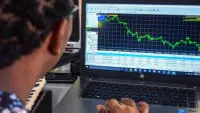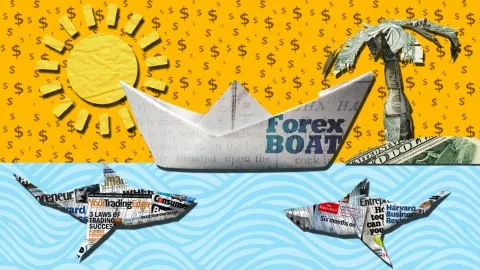
The Essentials of Forex Fundamental Analysis 
Forex traders can gain a better understanding of the market by learning the fundamentals of fundamental analysis. This guide provides an overview of how to use fundamental data to make successful trades. ▼
ADVERTISEMENT
Course Feature
![]() Cost:
Cost:
Free
![]() Provider:
Provider:
Udemy
![]() Certificate:
Certificate:
No Information
![]() Language:
Language:
English
Course Overview
❗The content presented here is sourced directly from Udemy platform. For comprehensive course details, including enrollment information, simply click on the 'Go to class' link on our website.
Updated in [March 06th, 2023]
This course, The Essentials of Forex Fundamental Analysis, provides an introduction to the fundamentals of forex trading using fundamental analysis. It begins by discussing 'what is fundamental analysis' in relation to forex markets and then delves into the most important fundamental factors that influence currency prices, such as GDP (Gross Domestic Product), CPI (Consumer Price Index), central banks, and interest rates, as well as geopolitical events. Participants will learn how to read an economic calendar and understand central bank policy and the impact on forex markets. Finally, the course will show participants how to use fundamental analysis to make profitable trades.
[Applications]
After completing this course, students should be able to apply the fundamentals of forex fundamental analysis to their trading. They should be able to read an economic calendar, understand central bank policy and its impact on forex markets, and use fundamental analysis to make profitable trades. Additionally, they should be able to identify the most important fundamental factors that influence currency prices, such as GDP, CPI, central banks, and interest rates, as well as geopolitical events.
[Career Paths]
1. Currency Trader: Currency traders are responsible for buying and selling currencies in the foreign exchange market. They use fundamental analysis to identify trends and make decisions about when to buy and sell currencies. They must be able to read economic calendars and understand central bank policy and its impact on the forex markets. As the global economy continues to grow, the demand for currency traders is expected to increase.
2. Forex Analyst: Forex analysts use fundamental analysis to identify trends and make predictions about the future direction of currency prices. They must be able to read economic calendars and understand central bank policy and its impact on the forex markets. They must also be able to interpret economic data and make informed decisions about when to buy and sell currencies. As the global economy continues to grow, the demand for forex analysts is expected to increase.
3. Forex Broker: Forex brokers are responsible for facilitating trades in the foreign exchange market. They must be able to read economic calendars and understand central bank policy and its impact on the forex markets. They must also be able to interpret economic data and make informed decisions about when to buy and sell currencies. As the global economy continues to grow, the demand for forex brokers is expected to increase.
4. Forex Educator: Forex educators are responsible for teaching others about the fundamentals of forex trading. They must be able to read economic calendars and understand central bank policy and its impact on the forex markets. They must also be able to interpret economic data and make informed decisions about when to buy and sell currencies. As the global economy continues to grow, the demand for forex educators is expected to increase.
[Education Paths]
1. Bachelor's Degree in Economics: A Bachelor's Degree in Economics is a great way to gain a comprehensive understanding of the fundamentals of economics and how they relate to the forex market. This degree will provide students with the knowledge and skills necessary to analyze economic data, understand the impact of economic policies on the forex market, and develop strategies for trading in the forex market. Additionally, this degree will provide students with the opportunity to develop their analytical and problem-solving skills, which are essential for successful forex trading.
2. Master's Degree in Finance: A Master's Degree in Finance is a great way to gain a comprehensive understanding of the fundamentals of finance and how they relate to the forex market. This degree will provide students with the knowledge and skills necessary to analyze financial data, understand the impact of financial policies on the forex market, and develop strategies for trading in the forex market. Additionally, this degree will provide students with the opportunity to develop their analytical and problem-solving skills, which are essential for successful forex trading.
3. Master's Degree in International Business: A Master's Degree in International Business is a great way to gain a comprehensive understanding of the fundamentals of international business and how they relate to the forex market. This degree will provide students with the knowledge and skills necessary to analyze international business data, understand the impact of international business policies on the forex market, and develop strategies for trading in the forex market. Additionally, this degree will provide students with the opportunity to develop their analytical and problem-solving skills, which are essential for successful forex trading.
4. Master's Degree in Data Science: A Master's Degree in Data Science is a great way to gain a comprehensive understanding of the fundamentals of data science and how they relate to the forex market. This degree will provide students with the knowledge and skills necessary to analyze data, understand the impact of data on the forex market, and develop strategies for trading in the forex market. Additionally, this degree will provide students with the opportunity to develop their analytical and problem-solving skills, which are essential for successful forex trading.
The development trends for these degree paths are increasing demand for data-driven decision making, the need for more sophisticated trading strategies, and the need for more comprehensive understanding of the global economy. As the forex market continues to grow and evolve, these degree paths will become increasingly important for those looking to succeed in the forex market.
Course Syllabus
What is Fundamental Analysis?
How to Use an Economic Calendar
Central Banks, The Fed & Monetary Policy Pt. 1
Central Banks, The Fed & Monetary Policy (Fed Funds Rate & FOMC) Pt. 2
Interest Rates and the Carry Trade
GDP (Gross Domestic Product)
CPI (Consumer Price Index)
Geopolitical Events
Commodity Currencies
How to Trade Using Fundamental Analysis
Pros & Cons

Thoroughly explained

great knowledge

great start

spot on information

no prior knowledge needed

concise and straight to the point

fundamentals summarised and made easy

simple.

Lack of real world examples

more detailed explanation needed

capitalization not explained.
Course Provider

Provider Udemy's Stats at AZClass
Discussion and Reviews
0.0 (Based on 0 reviews)
Explore Similar Online Courses

Systems Biology and Biotechnology

Python 101: Unlock Programm Skills - From Novice to Expert

Python for Informatics: Exploring Information

Social Network Analysis

Introduction to Systematic Review and Meta-Analysis

The Analytics Edge

DCO042 - Python For Informatics

Causal Diagrams: Draw Your Assumptions Before Your Conclusions

Whole genome sequencing of bacterial genomes - tools and applications

Algorithmic Trading In Forex: Create Your First Forex Robot!

Profitable Forex with Risk Control


Start your review of The Essentials of Forex Fundamental Analysis